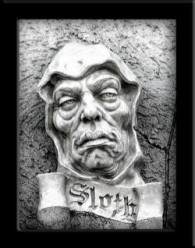Sloth, the besetting sin of our age!

Sloth has been considered one of the seven deadly sins for much of Church history. It can be described differently when viewed from different angles. In the world, it can call “itself Tolerance, but in hell it is called Despair,” according to Dorothy Sayers.
She continues,
It is the accomplice of the other sins and their worst punishment. It is the sin which believes in nothing, cares for nothing, seeks to know nothing, interferes with nothing, enjoys nothing, loves nothing, hates nothing, finds purpose in nothing. lives for nothing, and only remains alive because there is nothing it would die for.
Theologian Kevin Vanhoozer sees sloth as the besetting sin of our postmodern age. Ours is an age of “despairing indifference to the truth.”
Sloth is the ultimate sin of omission: sloth sits still, unmoved by anything real. Sleeping through a movie may not be deadly, but sitting on your hands while the cinema is burning around you certainly is. We must guard against sloth, the temptation to be lulled to sleep when there is something urgent to be done. Is there a cure for this spiritual narcolepsy? There is.
In seeking out this cure, Dr. Vanhoozer turns to the life and work of C. S. Lewis.
Lewis experienced a powerful awakening and afterwards did everything he could to stay awake, by which I mean spiritually alert to the opportunities, and dangers, that attend the Christian life. For Lewis, waking is a way of describing one’s conversion, a coming to new life. The Christian life is all about wakefulness. Theology describes what we see when we are awake, in faith to the reality of God, and discipleship is the project of becoming fully awake to this reality and staying awake.
The sad truth is that many of us are, at best, only half awake. We think we’re engaged with the real world — you know, the world of stock markets, stockcar racing, and stockpiles of chemical weapon — but in fact we’re living in what Lewis calls the “shadowlands.” We think we’re awake, but we’re really only daydreaming. We’re sleepwalking our way through life — asleep at the wheel of existence — only semi-conscious of the eternal, those things that are truly solid that bear the weight of glory.
More specifically, Vanhoozer sees Lewis’s use of the imagination as an antidote to spiritual sleepiness.
We want to believe the Bible — we do believe it, we confess the truth of its teaching, and we’re prepared to defend it — but we nevertheless find ourselves unable to see our world in biblical terms, and that produces a feeling of disparity, an existential disconnect. If faith’s influence is waning, as two-thirds of Americans apparently now think, then it is largely because of a failure of the evangelical imagination. We’re suffering from imaginative malnutrition. …
Those who follow Jesus Christ have been … jolted awake … by having descend on them tongues of fire. Remember the words of John the Baptist: “I baptize you with water. … He will baptize you with the Holy Spirit and fire” (Matthew 3:11). The Spirit of Christ burns in our hearts, awakening us to the presence and activity of Jesus Christ. Sleeper, awake!
The full quotation comes from the apostle Paul, in Ephesians 5:14: “Awake, O sleeper, and arise from the dead, and Christ will shine on you.” Lewis wants us to wake up, to live not in the shadowlands but in broad daylight — and he thinks the imagination can help. This, then, is our challenge: to understand how Lewis enlists the imagination in the cause of wakefulness rather than daydreaming.
Christianity has nothing to do with make-believe or wish fulfillment. There’s nothing romantic about crucifixion, nothing more nitty-gritty than nails piercing flesh, and nothing airy-fairy about bodily resurrection. I’m a theologian, and I’m the least superstitious person you’ll ever meet. I’m a realist who believes the world to be independent of what I say or think about it — but I’m also convinced that preachers and theologians minister reality. The question is: what’s the nature of reality? How can we come to know the truth about what is? …
In the remainder of this longish article, Dr. Vanhoozer explains the important relationships among theology, discipleship and the imagination.
We want to believe the Bible — we do believe it; we are prepared to defend doctrinal truth — but for the life of us, we find ourselves unable to relate the doctrine we profess to the lifestyle we practice. We feel a discrepancy, a fateful disconnect, between the world in which we live and the system of theology we believe. The imagination can help. I have said that theology is about the new reality in Christ and discipleship is about participating in that new reality. I now want to say that imagination is the faculty that wakes us up to that new reality and helps us to stay awake.
Please take time to read this insightful article in its entirety.
“In Bright Shadow: C.S. Lewis on the Imagination for Theology and Discipleship” is the title of Kevin Vanhoozer’s article, which was originally given as a conference talk. Video, audio and text are available here.


 December 29, 2015
December 29, 2015 







Comments are closed.